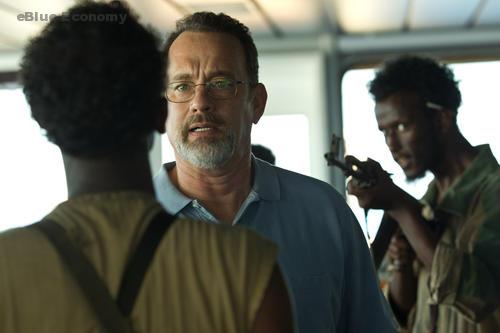Captain Phillips is a 2013 American biographical action thriller film directed by Paul Greengrass. Inspired by the 2009 Maersk Alabama hijacking, the film tells the story of the eponymous Captain Richard Phillips, a merchant mariner who was taken hostage by Somali pirates. It stars Tom Hanks as Phillips, alongside Barkhad Abdi as pirate leader Abduwali Muse.
The screenplay by Billy Ray is based on Phillips’s 2010 book A Captain’s Duty: Somali Pirates, Navy SEALs, and Dangerous Days at Sea, which Phillips co-wrote with Stephan Talty. Scott Rudin, Dana Brunetti, and Michael De Luca served as producers on the project. It premiered at the 2013 New York Film Festival,[4] and was theatrically released on October 11, 2013. The film emerged as a critical and commercial success, receiving positive reviews from critics and grossing $220 million against a budget of $55 million. Captain Phillips received six Academy Award nominations, including Best Picture, Best Adapted Screenplay, and Best Supporting Actor for Abdi.

Viewers will by and large remember the facts of the incident. Alabama, owned by Danish shipping company Maersk Line Ltd. and captained by Massachusetts-born Richard Phillips, was bound to Mombasa, Kenya from Djibouti with a cargo composed largely of American relief supplies. A band of Somali pirates, after a day of fruitless pursuit, managed to board the ship and hold the bridge crew hostage, eventually leaving with the $30,000 in the ship’s safe and Phillips himself, whom they intended to hold for ransom. “Captain Phillips” derives its power from the fact that writer Billy Ray and director Paul Greengrass show incredible restraint in their treatment of the story, seeking to portray the events with as much accuracy and as little comment as possible.

Does the movie Captain Phillips accurately show what happened in the Maersk Alabama?
On October 11, 2013, a movie called Captain Phillips, starring Tom Hanks as Captain Richard Phillips, premiered nationwide. The movie received glowing reviews and claims to be based on actual events.
In April 2009, the Maersk Alabama cargo ship was attacked and captured by four Somali pirates less than 300 nautical miles off the coast of Somalia. The captain and the crew were taken hostage, and the pirates took the captain, Richard Phillips, off the ship into a lifeboat. On orders from President Obama, the brave men and women of the U.S. Navy, and specifically Navy marksmen, fatally shot all but one of the pirates and rescued Captain Phillips. The story made national news.

Approximately half of the crewmembers, represented by Brian Beckcom, are claiming that the shipping company, Maersk Lines Limited, willfully allowed the
Maersk Alabama to sail directly into pirate-infested waters despite receiving multiple warnings to avoid the area. And the lawsuit further claims that Alabama didn’t have adequate anti-pirate security measures. That lawsuit was settled before it went to trial in Mobile, Alabama on December 2, 2013.

According to the lawsuit, Maersk essentially “outsourced” the security of Alabama to the U.S. military, and by extension, to the taxpayers of the United States, rather than provide basic anti-piracy prevention measures such as armed guards. Since the April 2009 attack, the Maersk Alabama has been approached by pirates on at least two other occasions, however, the pirates were quickly repelled by armed personnel who now accompany Maersk vessels that travel in pirate-infested waters.
https://www.imdb.com/video/vi699050009?playlistId=tt1535109&ref_=tt_ov_vi















